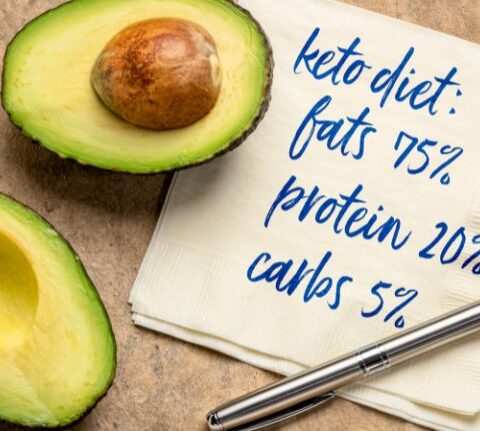Intermittent Fasting 101 - What You Need To Know
Intermittent Fasting is getting to be all the buzz these days. Have you heard of it? IF (Intermittent Fasting) is a weight loss technique that runs counter to the standard advice that you may have heard just a few short years ago. If you are like us, you have heard that it is practically sacrilegious to go without breakfast. Eat small meals more often to keep your metabolic fire burning, we were told. So, what is all the IF brouhaha about?
What Is Intermittent Fasting?
Well, the name describes what it is quite well.
Intermittent Fasting is a cycle for fasting that gives you a pattern of when to eat. It does not dictate so much what to eat, but the timing is the thing that is crucial here.
Simply put, Intermittent Fasting (IF) is a meal timing strategy (or eating pattern) that cycles between “fasting” and “eating” windows throughout the day. So, for parts of the day you don’t eat, and parts of the day you do eat. Make sense?
Technically, if you sleep, you are already “fasting” for approximately ⅓ of the day anyway, so this is extending that fast and doing it in a consistent way that can have benefits in weight loss and overall general physical well-being.
How To Do It?
There are several different ways that you can do it. Some people choose to fast for 16-20 hours a day leaving an eating period of 4-8 hours with which to eat all their allotted calories for the day. For instance, continuing your overnight fast (not breaking it with a “break fast”=breakfast) until about noon, and then not eating past 4 or 8 o’clock in the evening. This pattern is thus continued on a daily basis. Another popular method is to choose a couple of days a week that you go on a 24 hour fast (2 non-consecutive days) and eat normally for the rest of the week. Fasting for a full 24 hours is more challenging for most people though. Of course, some methods work better for some than for others. It is wise for the beginner to ease into the fasting groove and to see which cycle works best for you.
How Can Intermittent Fasting Help With Weight Loss?
As we are all aware, weight loss happens when your body burns more calories than it takes in on a regular basis. We know that our bodies will burn what is made available to it. Conventional wisdom has said that to keep your metabolism going, you must be eating on a regular basis and therefore providing regular fuel for your body to consume. The idea behind intermittent fasting is that during a fast if you do not provide any meal for an extended period of time as energy than it is more likely that your stored fat is what your metabolism will burn instead of regular meals that you provide.
One neuroscientist, Mark Mattson, is mentioned in the Johns Hopkins Health Review as saying that the reasoning behind the apparent success of IF is that each time you take in calories your liver stores up glucose in a form called glycogen. It takes several hours (sometimes up to 12 hours) for the glycogen to be processed out of the liver. Once this process is over, your body will start burning your stored fat which is then transformed into ketone bodies which are a chemical used as energy in the neurons of the brain. Ketones not only indicate that your body is burning fat, but it also has been known to help improve overall brain health. It has been proven to promote positive changes in synaptic functioning. “Fasting is a challenge to your brain, and we think that your brain reacts by activating adaptive stress responses that help it cope with disease.” says Mattson.
So, not only does IF help with lowering insulin levels and burning unwanted fat but if you try it, you will have the extra added benefit of protecting your brain health in the process. WINNING!
How Can Intermittent Fasting Improve your Meal Prep Life?
Besides the ways that we have already mentioned, there are a few other benefits worth noting:
- Intermittent Fasting has been reported to cause less muscle loss among those who tried it over those that chose to go with a continuous calorie restriction method.
- IF tends to help the cravings problem in that it is more focused on when to eat than what to eat. Of course, that doesn’t mean that you should go crazy binge eating sugar and carbs when you do eat, but IF, in general, is less restrictive on foods. Some people just find it easier than CR (calorie restriction).
- When you eat less, you will be spending less money on your food budget.
- No more being on a restrictive diet regime to get yourself ready for the summer or special occasions.
Who Should Avoid Intermittent Fasting?
As with most things in life, one size does not fit all. IF is the perfect solution for some people, but others should probably avoid it.
You might want to consider avoiding Intermittent Fasting in these cases:
- Are experiencing high-stress levels in your life? Do you have a stressful job that requires your high performance at all times? If so, it may not be right for you at this time. Fasting puts extra stressors on your body and you might not want to build stress upon stress in your life.
- Do you have a history of eating disorders? Intermittent fasting may bring you back to patterns of eating that were extreme and harmful in your life previously. If so, forego IF. Your health is more important than bringing you back to former patterns that proved to be destructive in your life. You can achieve similar results other ways.
- Are you new to sound nutrition and exercise protocols? You will want to get yourself eating right and exercising regularly in order to make your attempt at IF most effective. You will not lose weight on IF if you are eating poorly when you do eat-take it from me!
- Happen to be pregnant? When pregnant, both mother and baby have extra energy needs that require regular intervals of eating. Pregnancy is not the time to start intermittent fasting.
- Not sleeping well? Again, lack of sleep puts stress on your body. Make sure you are getting a good night's sleep before you consider adding the extra stress of fasting into your lifestyle.
- Are you diabetic? Meal Prep On Fleek ALWAYS suggests that you consult your physician before introducing something extremely new into your diet, but especially if it is a medical condition so closely related to diet like diabetes. It may or may not be a good thing to try, but your doctor will know how to best guide you in that decision.
Resource: Diabetic Meal Plan







